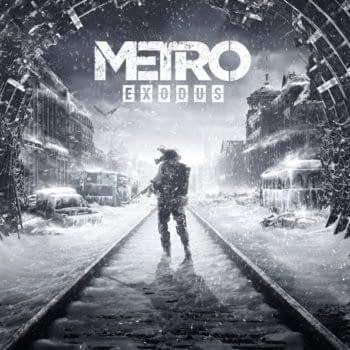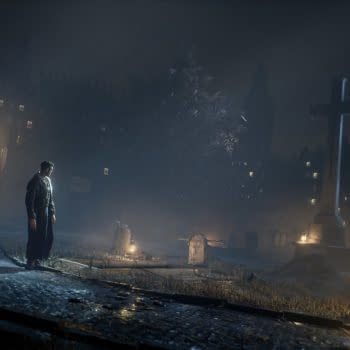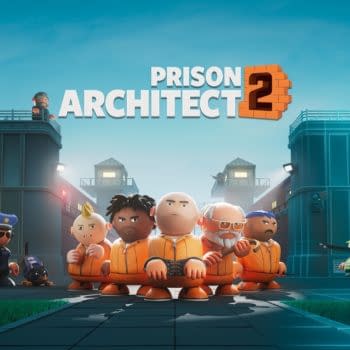Posted in: Games, Recent Updates, Video Games | Tagged: entertainment, games, Review, variable state, video games, virginia
Virginia Review: Brilliance And Frustration
I'm a big fan of games that 'try' something as too often in our publisher rich industry, things can be played a little too safe. That doesn't mean that these games aren't good, but they lack a little something that more of the experimental indie games have. A magic touch of something new. A sprinkle of fairy dust that is trying to make you feel something you don't usually in games. It's why I adore titles like Gone Home, Kentucky Route Zero, Everybody's Gone to the Rapture and The Beginner's Guide to name a few examples from the last few years.
Virginia is absolutely a merchant in 'trying' something. It is covered in that lovely experimental pixie dust that really makes those previously mentioned games tick. It's full of really interesting ideas and execution that it would be a shame for it not to be remembered. And even having said that, I don't know if I've been more annoyed at a game for a long time.
I have to clarify here, this isn't because I think Virginia is a bad game. I like so much about it, but squandered potential is even more frustrating for a reviewer than a straight up terrible title. Seeing something reach for the stars and squander the promise of its ideas is heartbreaking and it is something I saw Variable State's debut effort do over and over.
So what is Virginia? This is one of those First Person Experiences (or FPXs as I like to call them), in the same light as Firewatch or Dear Esther that have become popular in the indie space, with Virginia having more than a few passing echoes of Thirty Flights of Loving too. The game puts you into the shoes of an FBI agent who is on the case of a missing boy, and finds herself with a new, rather mysterious agent as a partner. The two women's relationship, be it trust or mistrust, along with the mystery of the boy are the central through line of the story which is very clearly X-Files and Twin Peaks inspired. The fascinating thing here is that this story is told entirely through visual storytelling as there is no spoken dialogue in the game. Everything is conveyed through visual cues in a stylised artstyle, be it based in reality or abstract images.
This story is entirely delivered through techniques familiar to any film. The game is cut into 'scenes', with effective edits like you would expect in any movie. As previously mentioned, this seems like a very clever expansion on some ideas put out by Thirty Flights of Loving. It toys with how we experience games, and Virginia really does great work with it here. The cuts are precise, and create a real sense of pace that most games can only dream of. Pacing, due to the 'openness' of the medium, is incredibly hard to control in games, but Virginias' really do work around that problem. This absolutely was my favorite thing about the title, meaning it has a real style to it that could really encourage others to think about how we 'experience' the moment to moment of an interactive artform. This is all fed by a beautiful score by Lyndon Holland that does a lot of emotional heavy lifting in the absence of dialogue.
So, Virginia is playing with some really captivating concepts, both about form and how we experience it that give it a weight of feeling 'significant'. Sounds great, right? That is the makings for a really unique, possibly special game. Well, as I mentioned previously, these ideas are what make me even more exasperated by the game's short comings.
To be frank, Virginia's story feels like an entirely wrong fit for these ideas. When the narrative is the entirety of the game's driving force, that's a fatal problem. This tale is a complicated one, and even if told by conventional means, it might be difficult to entirely grasp. There are a lot of characters, suspects, subplots and metaphorical imagery being used here, with a focus on interactions, as well as the central mystery. To make things even more complex, it plays with reality a fair bit, making you ask if something is happening for real, is a vision, or merely a dream. Virginia is trying to tell a story, and it is one worth telling, but the means here make it unclear at best in times. While similar abstractions can work in surrealist games like Kentucky Route Zero, here, it just makes the story I was desperately trying to commune with needlessly obtuse.
This is a symptom of another problem the game has, which feels like it might be the key here, and that is that the visual storytelling just doesn't feel strong enough. When not using dialogue or words to convey a story, the imagery you are using to tell your story better be hitting with pinpoint accuracy. Virginia's doesn't. Especially when it starts to play around with abstract story beats, the game feels loose due to staging of its ideas. The lack of grasp here means that the game's story feels murky and like it needed more space than it's really short running time allows.
Another huge problem the game had for me, is one of space. If story is one of the key pillars of an FPX, perhaps the next one is location. Surprisingly, for a game named after an actualy place, Virgina's world never felt grounded to me. The very best in the genre imprint their worlds on you, making it easy to bring to mind a floorplan of its most important parts. It is something that this game is sorely missing, meaning that this obtuse story never felt completely established either. While you return to several locations throughout the playthrough, you are constantly being whisked away to the next place in the blink of an eye, meaning that nothing truly imprints on you. This also isn't helped by an art style that while stylistically daring, I found uneven with bizarre colour grading, simple character faces and a distracting aspect ratio draped upon everything. At the worst of times, I might even say it was unsightly. One of the key problems in this department is that I found the game's spaces prohibitive. There were precious few instances of discovery or exploration, with a lot of the game pushing you from the start of the scene, down a straight line to click on the next thing. I wanted to explore. Find out about this world. Make sense of the nuance of the story that was trying to be told, but Virginia just didn't facilitate that anywhere near as much as I wanted it too.
This all lead Virginia to being one of the most frustratingly conflicted experience I've played in a long time. It's not bad, and is actually inspired in parts, but the story it tries to tell and the form it tries to tell it in don't seem in sync here. It's a crying shame, because both things separately have great merit. This story has beautiful moments, and the gameplay ideas are tantalizing, but they come together here to create something much less appetising than the sum of its parts. There are lots of things to learn and be influenced from here, and the concepts on display, especially when it comes to how it tells its story, could and should be used in the future. It's why I think Variable State have a bright future. There are so many things I love about Virginia, and because of that, it's short comings embittered me to no end.
Buy it if: You want to see a game full of ideas told in a really unique way, with some really good high points.
Avoid it if: You don't like FPXs, short games, or obtuse and abstract stories.
Score: 5.8/10















